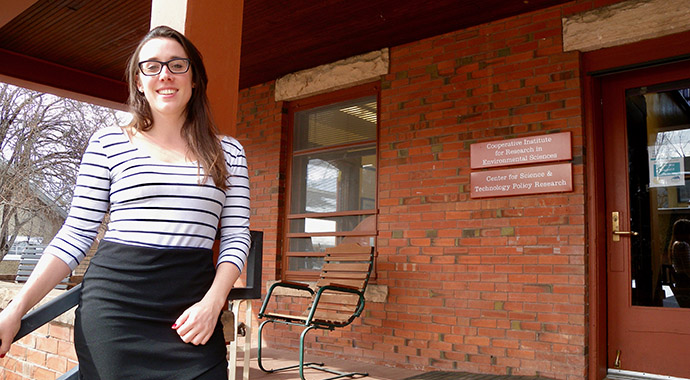Visitor Highlight
|
 CSTPR visiting scholar, Julia Schubert. Photo: Ami Nacu-Schmidt. CSTPR visiting scholar, Julia Schubert. Photo: Ami Nacu-Schmidt. |
How do you study the ways in which scientific expertise is brought into the process of policy making? And how do you capture its impact? One possibility is conducting a case study of policy-making in the works that is heavily dependent on politicians reaching out to scientists for their expertise. Julia Schubert, visiting scholar with the CIRES Center for Science and Technology Policy Research (CSTPR), is doing exactly this. Schubert comes to CSTPR from the Forum Internationale Wissenschaft in Bonn, Germany on a Fulbright Fellowship. As a doctoral student and sociologist, she is interested in the relationship between political entities and the types of scientific expertise they draw on. For her dissertation, geoengineering in United States politics serves as the empirical case study. Geoengineering refers to human intervention - specifically, deliberate and large-scale intervention - as a means to mitigate climate change. Examples include removal of carbon dioxide from the atmosphere, and solar radiation management, or the forced reflection of sunlight back to space. Since the 1990s, this field has received more attention from the United States government as politicians debate ways to combat the effects of climate change. Schubert says she was lucky to find an example of a policy debate that is relatively new. Because of the comparatively short time span (25 years) she had to draw documents from, she was able to systematically include all official documentation on geoengineering in U.S. decision-making in her compilation of data. These thousands of pages allow her to follow the progression of geoengineering as a political issue. “CSTPR is a great place to study this corpus,” said Schubert. “I can reflect and contextualize my findings, and there is great expertise on the policy process in the U.S. I also plan to talk to people in the organizations who work on geoengineering here in Boulder.” Geoengineering is publically controversial, due to the enormity of the intervention required - such human experiments with nature could be incredibly disruptive. However, as a technological solution it is politically attractive as it does not involve enforcing large-scale behavior changes that have been unpopular with voters. Further, it would create strong ties with industry. Proponents of these measures also argue that these technologies would have low costs compared to enforcing substantial cuts in greenhouse gas emissions. Schubert describes her project as building on two dimensions of analysis. In one aspect of her work, she asks how different types of expertise aid in defining and framing the problems associated with geoengineering in various ways - that is, how science shapes the discussion. Schubert is also curious about the many ways this expertise effectively entered the decision-making process. “I follow a communication-based perspective,” said Schubert. “On the one hand I want to know how the problem is addressed, how it is framed in the documents - on the other hand I am interested to see who is talking, which organizations or experts provide the relevant channels informing this policy process.” In a February 22 CSTPR noontime seminar, Schubert discussed two specific types of expertise that have been instrumental in framing the political discussion on geoengineering: climate models and threshold values. Both types of expertise play a substantial but distinct role for the political decision-making process at hand. Climate models, or how we mathematically model the changing climate of the Earth, are hotly debated for their accuracy in predictions - they present climate change as a scientific challenge and were particularly relevant in the early discussions of the problem. Threshold values, on the other hand, are highly politicized, communicating climate change as an urgent political challenge. |

